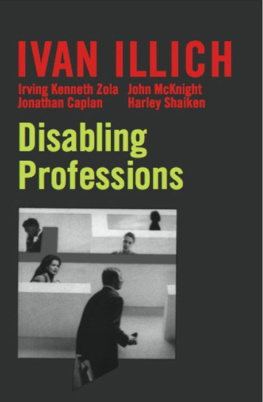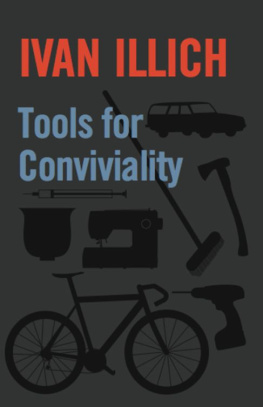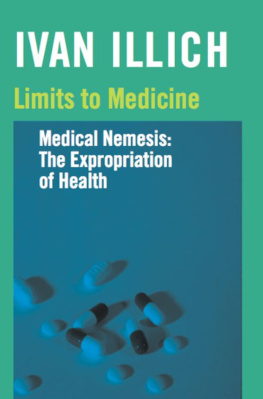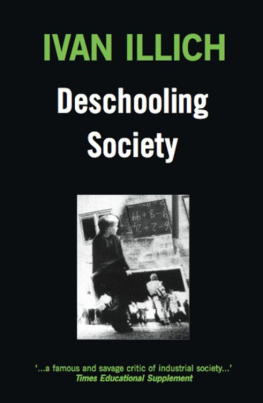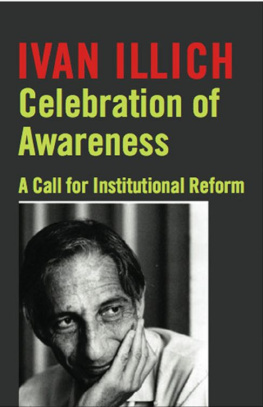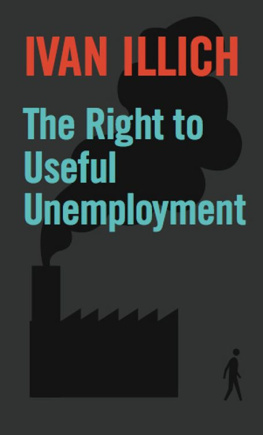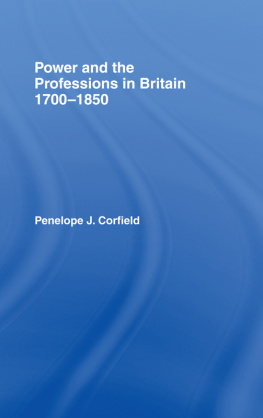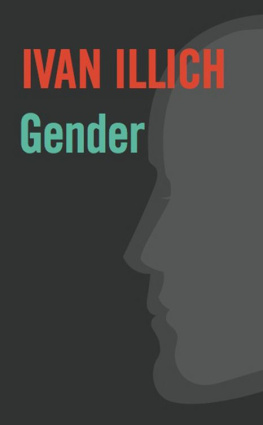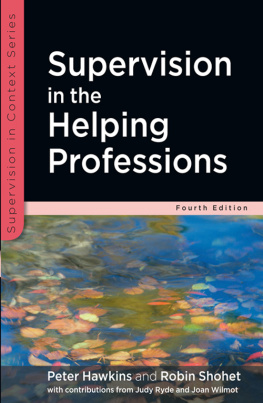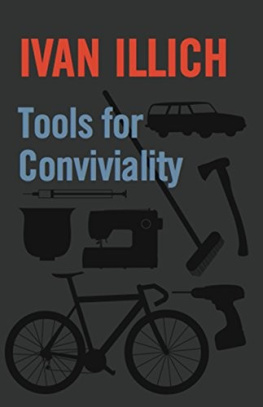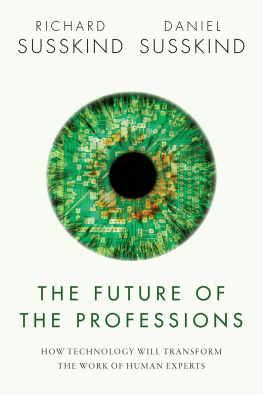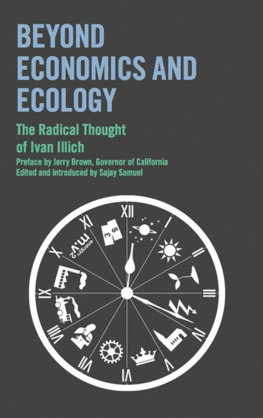CONTENTS
Disabling Professions
IVAN ILLICH
Healthism and Disabling Medicalization
IRVING KENNETH ZOLA
Professionalized Service and Disabling Help
JOHN M C KNIGHT
Lawyers and Litigants: A Cult Reviewed
JONATHAN CAPLAN
Craftsman into Baby Sitter
HARLEY SHAIKEN
The professionals, that is the skilled and learned experts who apply their knowledge to the affairs and in the service of others, are traditionally held in high esteem. For generations, divinity, the law, medicine and even the military and now the newer professions in the fields of education, welfare, architecture, industrial management etc. have been acknowledged as being selflessly devoted to the good of the weaker and less knowledgeable members of society, thus enabling those who lack the capacity to fend for themselves to lead fuller, safer and healthier lives. However, the question must now be asked whether the professions in fact provide their services so altruistically, and whether we are really enriched and not just subordinated by their activities. There is a growing awareness that during the past twenty years or so, the professions have gained a supreme ascendency over our social aspirations and behaviour by tightly organizing and institutionalizing themselves. At the same time we have become a virtually passive clientle: dependent, cajoled and harrassed, economically deprived and physically and mentally damaged by the very agents whose raison dtre it is to help.
But the debate about the beneficence of the professions must not express itself merely in vague frustrations. We must make an organized attempt to understand what the professions power consist of and by what they are motivated. And we must examine the nature of our own submission to the professions disabling effects, now and in the future. This symposium, whose contributors are as disparate as as social philosopher and factory worker, presents, as is the the intention of the IdeasinProgress series, a true parliament of ideas: it analyzes and traces the history of professional power in many fields; it demonstrates specific disabilities which have been created by modern professions; it pinpoints the political dangers of oligarchic and self-appointed litist institutions, and it sounds a clarion call for professionals to stop making a monopoly of their vocations and for people to be more discriminating in their choice of alternatives.
Each of the essays provides a basis for the author to expand his ideas and solutions into a fuller treatment at a future occasion. It is hoped that readers will avail themselves of the opportunity given in this publication to enter into the debate by accepting the invitation to communicate with the authors and to express their views, hopefully as much in disagreement as in agreement.
THE PUBLISHERS
One way to close an age is to give it a name that sticks. I propose that we name the mid-twentieth century The Age of Disabling Professions, an age when people had problems, experts had solutions and scientists measured imponderables such as abilities and needs. This age is now at an end, just as the age of energy splurges has ended. The illusions that made both ages possible are increasingly visible to common sense. But no public choice has yet been made. Social acceptance of the illusion of professional omniscience and omnipotence may result either in compulsory political creeds (with their accompanying versions of a new fascism), or in yet another historical emergence of neo-Promethean but essentially ephemeral follies. Informed choice requires that we examine the specific role of the professions in determining who got what from whom and why, in this age.
To see the present clearly, let us imagine the children who will soon play in the ruins of school buildings, air terminals and hospitals. In these concrete castles turned cathedrals, built to protect us against ignorance, discomfort, pain and death, the children of tomorrow will reenact in their play the delusions of our Age of Professions, as from ancient castles and cathedrals we reconstruct today the crusades of knights against sin and Turk in the Age of Faith. Children in their games will mingle the uniquack which now pollutes our language with archaisms inherited from robber barons and cowboys . I see them addressing each other as chairman and secretary rather than as chief and lord. Even now some adults have the grace to blush when they slip into managerial pidgin English with terms such as policy-making, social planning and problem-solving.
The Age of Professions will be remembered as the time when politics withered, when voters, guided by professors, entrusted to technocrats the power to legislate needs, renounced the authority to decide who needs what and suffered monopolistic oligarchies to determine the means by which these needs shall be met. It will be remembered as the age of schooling, when people for one-third of their lives had their learning needs prescribed and were trained how to accumulate further needs, and for the other two-thirds became clients of prestigious pushers who managed their habits. It will be remembered as the age when recreational travel meant a packaged gawk at strangers, and intimacy meant following the sexual rules laid down by Masters and Johnson and their kin; when formed opinion was a replay of last nights TV talk-show, and voting the approval of persuaders and salesmen for more of the same.
Future students will be as much confused by the supposed differences between capitalist and socialist professional institutions as todays students are by the claimed differences between late Reformation Christian sects. They will discover that the professional librarians, surgeons, or supermarket-designers in poor and/or socialist countries towards the end of each decade came to keep the same records, used the same tools, built the same spaces that their colleagues in rich countries had pioneered at the decades beginning. Archeologists will label the ages of our lifespan not by potsherds but by professional fashions, reflected in the mod-trends of UN publications.
It would be pretentious to predict if this age, when needs were shaped by professional design, will be remembered with a smile or with a curse. I do, of course, hope that it will be remembered as the night when father went on a binge, dissipated the family fortune, and obligated the children to start anew. Sadly, and much more probably, it will be remembered as the age when a whole generations frenzied pursuit of impoverishing wealth rendered all freedoms alienable and, after first turning politics into the organized gripes of welfare-recipients, extinguished itself in a benign totalitarianism . I consider such a descent into technofascism as unavoidable unless the major thrust of social criticism begins to change from the support of a new or radical professionalism into the endorsement of a patronizing and sceptical attitude towards the expertsespecially when they presume to diagnose and to prescribe. As technology is blamed for environmental degradation, the complaint may be turned into a demand that engineers ought to study biology. As long as hospital catastrophes are blamed on the rapacious doctor or the negligent nurse, the question of whether the patient can in principle benefit from hospitalization is never raised. If mere capitalist gain is blamed for an economics of inequality, industrial standardization and concentrationcausing an unequal power structurewill be left uncriticized and unchanged.
Only if we understand the way in which dependence on commodities has legitimized wants, coined them urgent and exasperated needs while simultaneously destroying peoples ability to fend for themselves, can the progress into a new dark age be avoided, an age in which masturbatory self-indulgence might be the safest assertion of independence . Only if our cultures market intensity is systematically exposed as the source of its deepest built-in frustrations will we stop the current perversion of research, ecological concern and the class struggle itself. Presently, these activities are principally in the service of an increased servitude of people to commodities.

